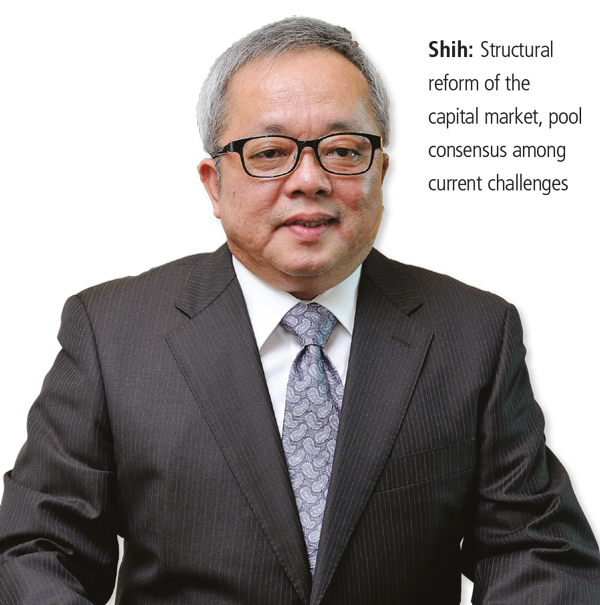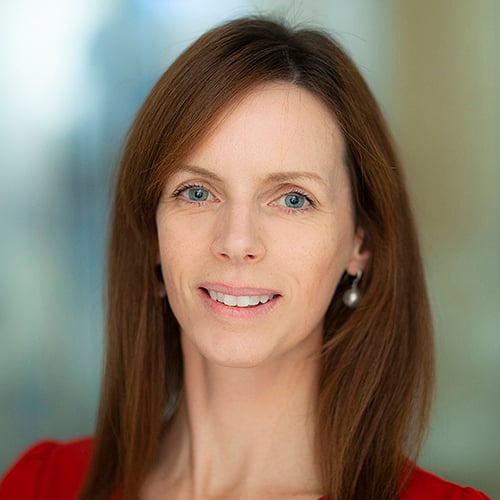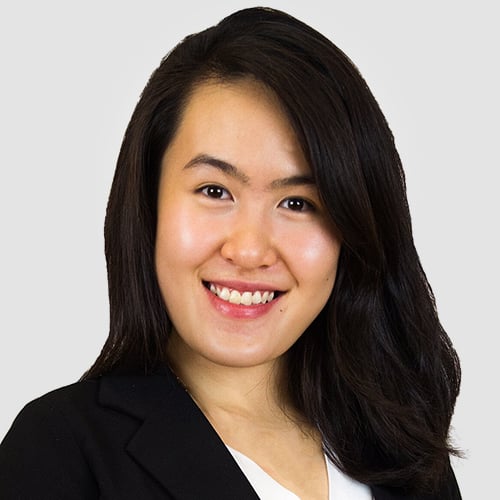What would you say are your top priorities for TWSE this year?
Implementing national financial policies is a priority. We are fully cooperating with the Financial Supervisory Commission’s (FSC) Program of Financial Sector Supporting the Real Economy – Four Supports with Three Powers, with focus on important measures that include jointly establishing the Entrepreneurship Fund by securities and futures related institutions and industry associations. We also plan to provide diversified ETF to increase investor participation. Technology is also important for us. TWSE has set up the Blockchain Seminar Group to study and discuss the application and development of this technology in the securities market. TWSE will also study and discuss how to make CSR Index for Taiwan-based listed companies using the compilation of the socially responsible investment index in the world as reference and according to the development of Taiwan’s securities market. We expect to launch this in 2017.
Implementing national financial policies is a priority. We are fully cooperating with the Financial Supervisory Commission’s (FSC) Program of Financial Sector Supporting the Real Economy – Four Supports with Three Powers, with focus on important measures that include jointly establishing the Entrepreneurship Fund by securities and futures related institutions and industry associations. We also plan to provide diversified ETF to increase investor participation. Technology is also important for us. TWSE has set up the Blockchain Seminar Group to study and discuss the application and development of this technology in the securities market. TWSE will also study and discuss how to make CSR Index for Taiwan-based listed companies using the compilation of the socially responsible investment index in the world as reference and according to the development of Taiwan’s securities market. We expect to launch this in 2017.

Promoting the listing of excellent enterprises is another priority for TWSE as well as pursuing market quality. The most important function of the capital market is to make resource allocation more efficient through the function of price discovery. To this end, Taiwan’s market must be a market that can quickly respond to information, trade smoothly and reduce trading cost. Transparent information, flexible trade system, and reasonable trade costs are essential conditions. In the future, TWSE will prioritize boosting market turnover and fully observe FSC’s policies to loosen unnecessary controls and reform systems so as to create a more efficient capital market platform.
How is TWSE able to differentiate itself from other exchanges?
In an intensely competitive environment, differentiation and persistence can be tough. However, TWSE insists on its own features and advantages and actually establishes investment value. Taiwan’s stock market enjoys several important features deeply loved by international investors – its stable currency and financial environment; feature of clustering high-tech industry; high stock dividend yield equivalent to the highest in the world (3.9% as of September 29 2016; 4.0% as of December 30 2016) and relatively reasonable price-earnings ratio at 17.2x as of September 29 2016. I want to especially note that in the context of exchanges all over the world vying for international capital, TWSE can proudly assert that it has never separated itself from the real economy as it still persists in serving real needs of enterprises and investors and never compromises market quality.
In an intensely competitive environment, differentiation and persistence can be tough. However, TWSE insists on its own features and advantages and actually establishes investment value. Taiwan’s stock market enjoys several important features deeply loved by international investors – its stable currency and financial environment; feature of clustering high-tech industry; high stock dividend yield equivalent to the highest in the world (3.9% as of September 29 2016; 4.0% as of December 30 2016) and relatively reasonable price-earnings ratio at 17.2x as of September 29 2016. I want to especially note that in the context of exchanges all over the world vying for international capital, TWSE can proudly assert that it has never separated itself from the real economy as it still persists in serving real needs of enterprises and investors and never compromises market quality.
What is the plan to ensure the exchange is on path to become Asia’s ETF hub?
As of the end of 2016, there are more than 60 ETFs in Taiwan’s ETF market. TWSE will in the future continue to actively develop diversified ETFs in the following directions:
As of the end of 2016, there are more than 60 ETFs in Taiwan’s ETF market. TWSE will in the future continue to actively develop diversified ETFs in the following directions:
1. ETF’s layout in the global market. Recently, a number of plain vanilla ETFs and leveraged/inverse ETFs tracking overseas equity indices such as the DJIA (Dow Jones Industrial Average) and NASDAQ 100 were launched in Taiwan. We now provide ETFs tracking the stock markets of Hong Kong, India, mainland China, Japan, Europe and the US. Besides, with the efforts and cooperation of TWSE and KRX (Korea Exchange) and their practitioners, ETF tracking KOSPI200 (Korean Stock Price Index 200) was launched in Taiwan.
2. Expanding ETFs into a broader range of asset classes. Assets covered by listed ETFs now include domestic and foreign stock, gold and crude oil. In 2016, TWSE launched leveraged and inverse futures ETFs and VIX ETF. We expect to roll out fixed-income ETFs and currency ETFs in the future, providing access to more asset classes to help investors achieve diversification and assets allocation through ETFs.
3. Focusing on product innovation meeting social and market needs. To adapt to the low interest rate market environment and the ageing society, TWSE has promoted the compilation of low-volatility and high-dividend indices in order to develop relevant robust ETFs to meet the investment needs of seniors and conservative pension funds. In 2015, TWSE launched the Corporate Governance 100 Index, which was licensed to investment trust companies. Relevant ETFs are expected to be launched in the future to guide market capital to invest quality companies that perform well in corporate governance and corporate social responsibility.
4. Allowing ETFs traded in more diversified currencies. The dual-currency trading mechanism was officially put into service on August 8 2016, breaking through the situation in which investors could only trade our listed products in NTD (New Taiwan Dollar) in the past. Presently we have two ETFs which may be traded both in NTD and RMB in the secondary market. Investors can also convert their NTD position into RMB, and vice versa. In the future, the study and discussion will continue on including other currencies based on market needs and response so as to expand multi-currency product offering and to increase investment flexibility.
How does TWSE keep pace with the growing interest in ESG investing?
The TWSE has been maintaining good interaction with institutional investors and international corporate governance-related organizations such as ICGN (International Corporate Governance Network) and ACGA (Asian Corporate Governance Association). We are fully aware that sustainability and corporate governance are becoming mainstream in the investment community.
The TWSE has been maintaining good interaction with institutional investors and international corporate governance-related organizations such as ICGN (International Corporate Governance Network) and ACGA (Asian Corporate Governance Association). We are fully aware that sustainability and corporate governance are becoming mainstream in the investment community.
As early as 2003, TWSE has been promoting corporate governance reform measures following the Executive Yuan of Taiwan’s policy and have done even more after we set up the Corporate Governance Center based on the FSC’s Corporate Governance Roadmap in 2013.
Many best practices and insights were introduced through regulations or guidelines including independent director, audit and other functional committees, IFRS, and CSR (sustainability) reporting. One very special measure is the Corporate Governance Evaluation for all listed companies, which has successfully lead companies to achieve better corporate governance practices.
It’s worth noting that with all the efforts, the ACGA ranked Taiwan 4th place among 11 Asia-Pacific markets in its 2016 CG WATCH, two places higher than in 2014. ACGA specifically noted that Taiwan had made the greatest progress among other markets. The ACGA is an investor-based organization and this report does show that Taiwan has met institutional investors’ expectation.
TWSE has been canvassing the views of listed firms on boosting market activity. Can you share some of the findings?
A few noteworthy highlights of the results are described as follows:
A few noteworthy highlights of the results are described as follows:
1. Expressing acceptance and support for the 10 plans concerning financial technology led by the FSC. Securities and futures practitioners have a better understanding of the plans than IT peers.
2. As for the 10 plans concerning financial technology, establishing and integrating safe network identity verification mechanism, setting up financial information safety sharing and analysis centre, and financial talents training are the most valued projects.
3. Information suppliers and new entrepreneurs are rather active in applying new financial technology, while securities and futures practitioners are relatively conservative.
4. As to the role that the capital market shall play in promoting the development of financial technology, securities and futures practitioners believe that the capital market shall prioritize the promotion of mature technologies, while from the perspectives of information suppliers and new entrepreneurs, the capital market shall play the role of financing source. But both sides agree that a technical exchange platform should be established.
What is your view on advancing technology in trading and its impact on TWSE?
The recent development of high technologies has exerted positive and negative influence on the market. For example, the popular algorithm trading provides the market better liquidity. But on the other hand, it is more likely to obtain a better knockdown price than common individual investors, thanks to its fast trading that is increasing common individual investors’ trade cost. And if there is something wrong with the algorithmic model, market disruption will probably appear. At this point, the Flash Crash in 2010 is a prime example.
The recent development of high technologies has exerted positive and negative influence on the market. For example, the popular algorithm trading provides the market better liquidity. But on the other hand, it is more likely to obtain a better knockdown price than common individual investors, thanks to its fast trading that is increasing common individual investors’ trade cost. And if there is something wrong with the algorithmic model, market disruption will probably appear. At this point, the Flash Crash in 2010 is a prime example.
Therefore, in the face of the recent developments of high technologies, TWSE has in recent years actively promoted projects to adapt to this wave of high technology such as promoting the second-generation trading system online and improving trade volume and speed to adapt to challenges from information technologies. We constructed the high-specification machine room in 2016 to improve the availability, security and expandability of the computer system.
What are your biggest worries in pursuing your job as chairman of TWSE?
As chairman of TWSE, my greatest challenge involves the structural reform of the capital market, pool consensus and resolving long-standing fundamental problems. In particular, as the market system is not resilient enough, more efforts are needed for it to keep up with international practices. Moreover, the market management concept will have to be rebuilt from the perspective of users (investors and enterprises) to create a friendly and more efficient capital market environment.
As chairman of TWSE, my greatest challenge involves the structural reform of the capital market, pool consensus and resolving long-standing fundamental problems. In particular, as the market system is not resilient enough, more efforts are needed for it to keep up with international practices. Moreover, the market management concept will have to be rebuilt from the perspective of users (investors and enterprises) to create a friendly and more efficient capital market environment.
There is still great room for expanding the lines of business of securities firms. There is still a long way to go to actually implement the functions of intermediaries. How to improve the services provided to investors and actually assuming the responsibility of risk management are what the whole securities industry needs to work on. The sea change has occurred in the securities market around the globe: the rise of the emerging markets; popularity of trades via alternative trading systems (ATS); expansion of multi-layered markets; and impact of finance technologies. So we need new ideas to develop and supervise Taiwan’s market.





.jpg)
.jpg)


